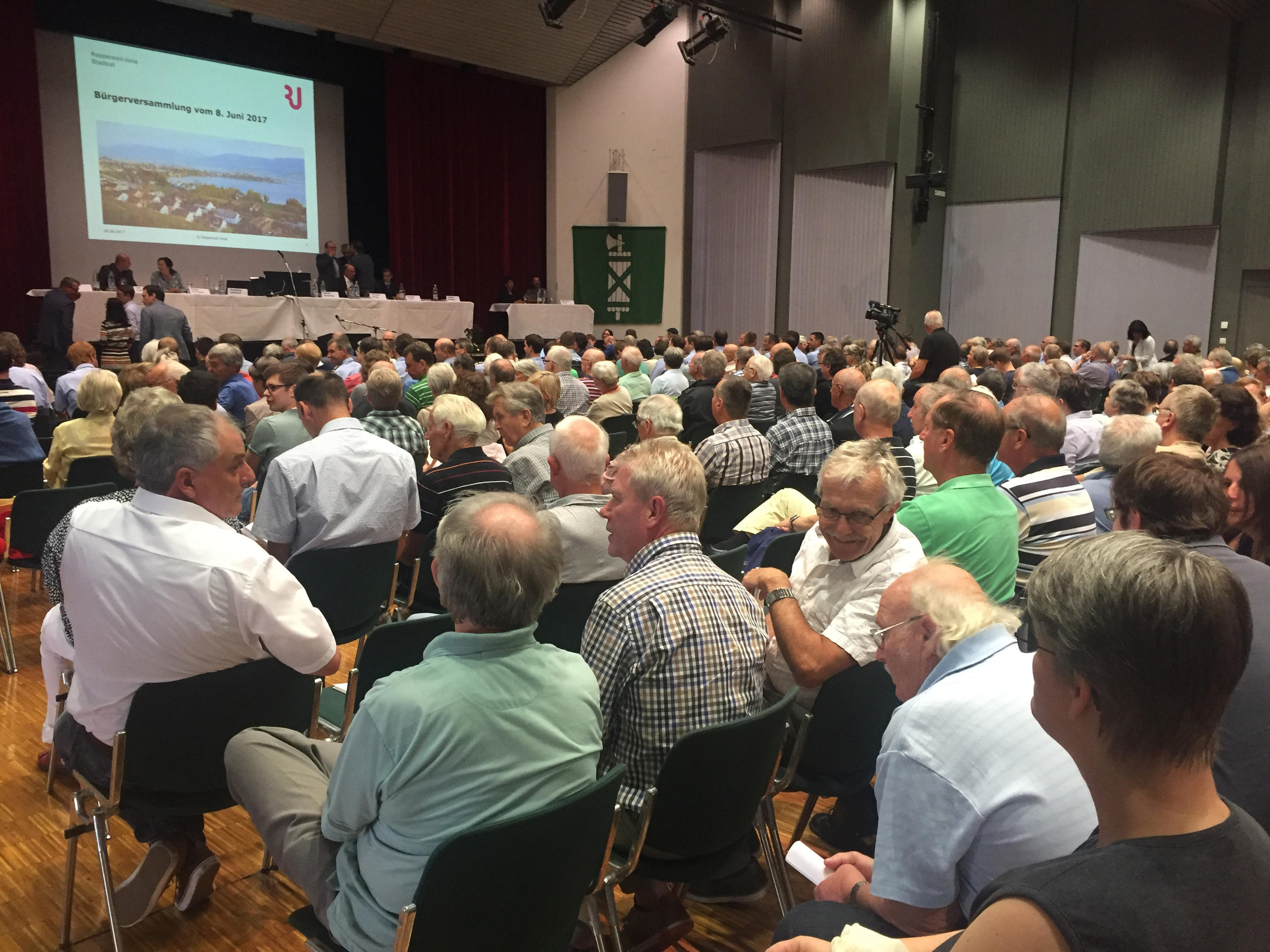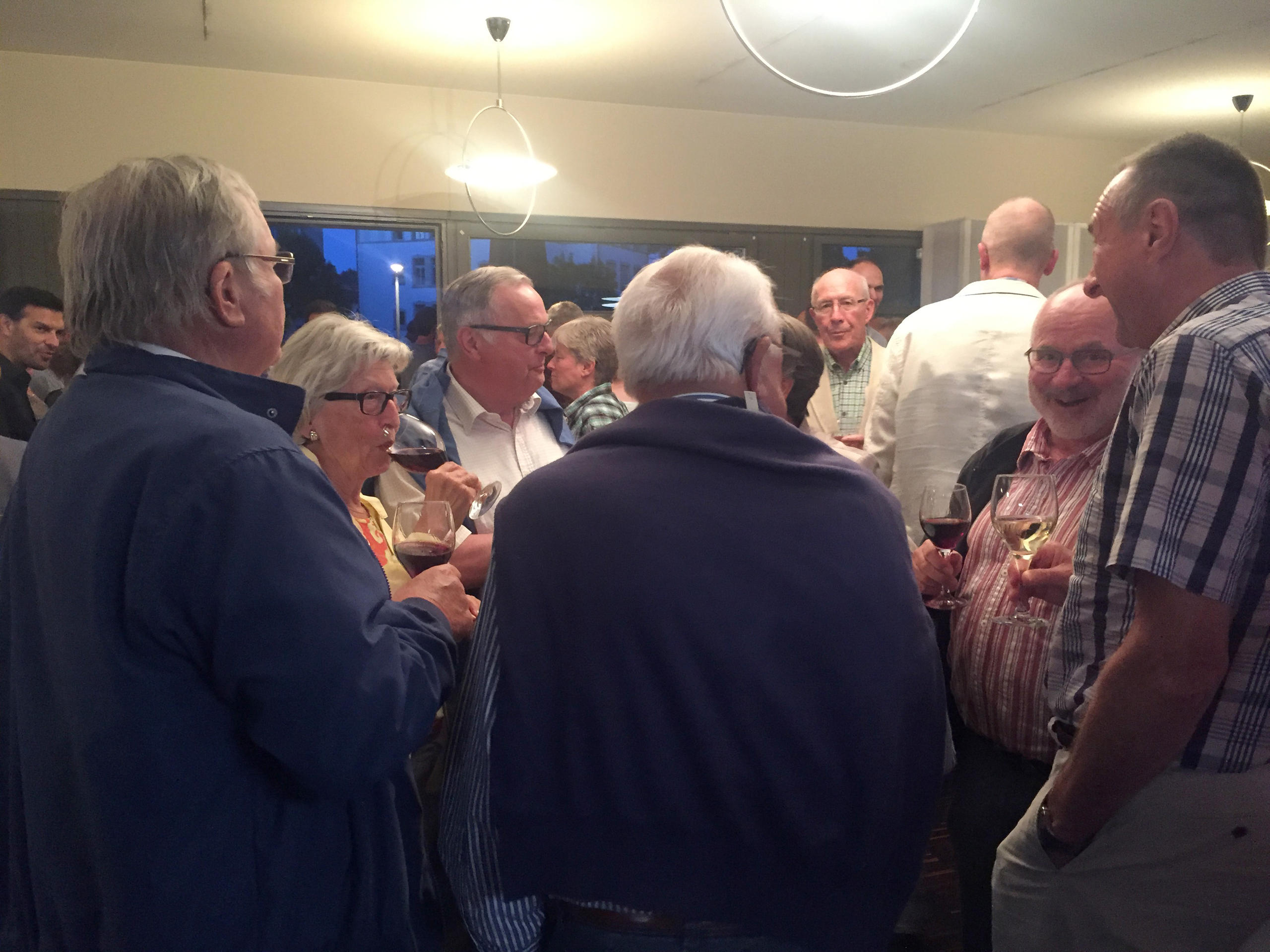
Rapperswil, a democratic dinosaur?

With its 27,000 inhabitants, Rapperswil is Switzerland’s largest community where citizens still decide on political issues at town hall meetings. But in June this year, only 350 people took part. Is this a sign of local direct democracy losing its popularity, or even of political bankruptcy?
“I’d like to ask why there are no ashtrays at the new bus stop,” says a man, who has just walked through the packed multipurpose hall, into the microphone. In an effort to add some weight to his words, he pauses before striding back to his seat.
The members of the city parliament are assembled on stage when the mayor, Martin Stöckling, steps up to the speakers’ desk. Question time at the end of each town hall meeting in Rapperswil, or “Rappi” as the locals call it, is when Stöckling is in his element.
The citizens have just finished discussing the items on the agenda: rehabilitating the sports grounds and the financial statement for 2016. Now the floor is open; it’s a chance to ask the municipal executive power big or small questions.
On this particular evening in June, 350 people listen, occasionally whispering or grumbling when they are unhappy with a vote. One could assume that the people gathered in this hall with heavy velvet curtains and shiny wooden floors are part of a small village community discussing everyday details, such as disposal options for cigarettes at bus stops.
Far from it! Rapperswil-Jona is home to about 1,400 companies, and last year the town spent more than CHF200 million ($207 million) on maintaining schools and roads, providing care for the elderly and treating wastewater. Around 18,000 people over 18 have a Swiss passport and are entitled to vote, but only 350 have shown up at the town hall.
National downward trend
Rapperswil-Jona is not the only place with such a low participation rate. Throughout Switzerland, attendance in town hall meetings is pretty poor and hovers between 20% in the smallest villages and just a few per cent in the biggest communities.
A municipal survey regularly conducted by political scientist Andreas Ladner shows that attendance has steadily declined over the past 30 years. Ladner is professor at the Swiss Graduate School of Public Administration at the University of Lausanne.
The reasons are numerous: villagers are no longer as deeply rooted as they used to be and are less interested in local politics; there are more leisure activities on offer and people have become wealthier. Also, many people no longer see the point in getting involved in local politics or even trying to make a change.
These town hall meetings have turned Rapperswil-Jona into a sort of dinosaur when it comes to this form of local democracy. Other big or medium-sized communities have replaced this public gathering with an organ of indirect democracy, namely the local parliament.
Clear vote for public meetings
Introducing such a parliament has also been discussed in Rapperswil-Jona. However, two years ago locals vehemently rejected this notion. A cross-party committee launched an initiative to introduce a local parliament, arguing that the town had become too big for town hall meetings and that the items on the agenda were getting too complex for the city parliament and voters. Another argument was that hardly anyone attends town hall meetings these days anyway.
After a very emotional debate, the majority found that a local parliament was too expensive, too rigid and far too detached from the people.

Today, an average of about 400 people come regularly to the public meetings, which is slightly more than pre-2015. The poor attendance of 350 people on that June evening was the lowest since then.
Procedural issues
What does it mean when just 1.9% of the voting population decides upon the destiny of a whole town? Are such decisions actually legitimate?
“Ultimately it’s the voters’ decision. They have opted for the town hall meetings,” Ladner says. “When it comes to factual issues, I don’t think participation figures are a problem.”
It’s a different matter though when it comes to procedural issues such as the merger of two municipalities or changes in the constitution or regulations, such as local bylaws.
“From a democratic point of view, central issues such as the organisation of a society should be decided by a wider circle and should be decided at the ballot box,” he says.
Ladner further emphasises the importance of strong and competent supervisory committees. They usually consist of elected members supervising the work of the executive power and administration. Just like in many other Swiss communities, a seven-member control committee undertakes this task in Rapperswil-Jona. The committee checks whether everything is being put into practice just as the town council presented it to the public.
Informal platforms
Due to its size and the fact that decisions are still made at town hall meetings, Rapperswil-Jona was looking for a “third option”, says Martin Stöckling, the mayor.
This resulted in the town forum, an informal body which associations and parties belong to. The town forum has no democratic legitimacy, which means its suggestions and ideas are not binding for the town council.
“We know that we need platforms for people to shape their opinions,” Stöckling says. The peoples’ participation remains important. “We’re trying to find new and common models which we would like to use for town planning.”
The sense of community can certainly be felt during the refreshments, which the local community usually serves after the meeting. Participants can devour ham croissants, savoury cheese cakes, wine, beer, fruit juice or water. And they have a lot of fun. There is enough space for everyone in the lobby, and some people enjoy the warm summer temperatures on the terrace. This small cheerful circle determines the future of a whole town.
(Translated from German by Billi Bierling)

In compliance with the JTI standards
More: SWI swissinfo.ch certified by the Journalism Trust Initiative




























You can find an overview of ongoing debates with our journalists here . Please join us!
If you want to start a conversation about a topic raised in this article or want to report factual errors, email us at english@swissinfo.ch.